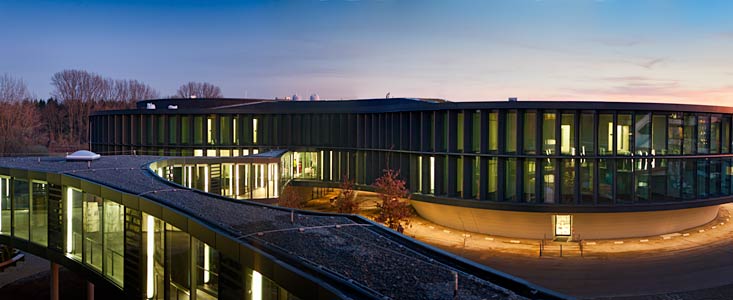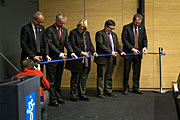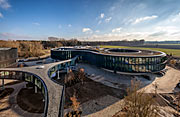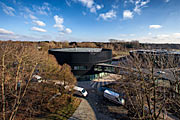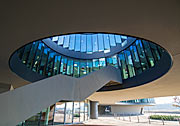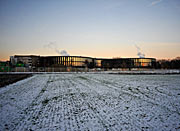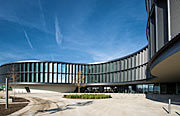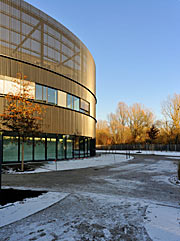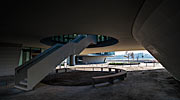Comunicato Stampa
Inaugurato l'ampliamento del Quartier Generale dell'ESO
Aperti ufficialmente i nuovi edifici del Quartier Generale dell'ESO a Garching
05 Dicembre 2013
Il 4 dicembre 2013 si è svolta una cerimonia per inaugurare i nuovi uffici del Quartier Generale dell'ESO a Garching bei München, Germania. Alla celebrazione hanno partecipato i membri del Consiglio dell'ESO, autorità locali, gli architetti Auer+Weber+Assoziierte, il contraente principale BAM Deutschland AG e il gruppo dirigente dell'ESO.
L'inaugurazione dell'ampliamento rappresenta un momento importante nella storia dell'ESO poichè non solo riunirà tutto il personale dell'ESO a Garching in un unico sito, facilitando preziose collaborazioni, ma fornirà anche un edificio tecnologico in cui montare, verificare e aggiornare gli strumenti più all'avanguardia dell'ESO. L'ampliamento è stato reso possibile grazie anche a un generoso contributo del Ministero federale tedesco per la Scienza e la Ricerca.
Questi due edifici - uno per uffici di 10 300 metri quadrati e uno tecnico di 2900 metri quadrati - e l'area circostante coprono più del doppio della superficie attualmente occupata dal Quartier Generale dell'ESO a Garching. Questo spazio aggiuntivo era veramente necessario poichè il personale dell'ESO al momento è sparso in vari punti del campus di Garching.
Inoltre, con l'E-ELT (European Extremely Large Telescope) all'orizzonte, l'ESO aveva bisogno di un luogo fisico in cui far nascere le innnovazioni tecnologiche che l'ambizioso progetto richiede. L'edificio tecnico - che ospiterà anche uno dei più grandi archivi informatici di dati astronomici al mondo - sarà il fulcro di questa opera.
I due edifici e il ponte che li collega alla sede attuale sono stati ideati dagli architetti Auer+Weber+Assoziierte dopo un concorso di architettura a cui hanno partecipato numerosi progetti. Lo studio è responsabile anche dell'ideazione della Residencia dell'Osservatorio del Paranal dell'ESO in Cile, che ha ricevuto il premio LEAF nel 2004 e il premio Cityscape Architectural Review nel 2005.
Il progetto dell'ampliamento è in armonia con l'edificio originale. L'edificio per uffici, che ne segue la forma curva, sfrutta le fonti di luce naturale e dispone di due cortili interni. L'edificio tecnologico è un cilindro di diametro simile allo specchio primario dell'E-ELT da 39 metri.
Entrambi gli edifici sono classificati come 'green' poichè il consumo di energia sarà molto inferiore a quello tipico di un edificio di queste dimensioni. Ciò è dovuto alla facciata ben isolata e al fatto che l'edificio è scaldato e raffrescato per mezzo dell'attivazione termica della massa di calcestruzzo - per cui viene usata una pompa di calore alimentata dall'acqua di falda - e riscaldato da una rete di teleriscaldamento che sfrutta la geotermia.
Questo ampliamento - la cui costruzione è iniziata nel gennaio 2012 - segna un significativo passo avanti nell'evoluzione costante dell'ESO.
Ulteriori Informazioni
L'ESO (European Southern Observatory, o Osservatorio Australe Europeo) è la principale organizzazione intergovernativa di Astronomia in Europa e l'osservatorio astronomico più produttivo al mondo. È sostenuto da 15 paesi: Austria, Belgio, Brasile, Danimarca, Finlandia, Francia, Germania, Gran Bretagna, Italia, Olanda, Portogallo, Repubblica Ceca, Spagna, Svezia, e Svizzera. L'ESO svolge un ambizioso programma che si concentra sulla progettazione, costruzione e gestione di potenti strumenti astronomici da terra che consentano agli astronomi di realizzare importanti scoperte scientifiche. L'ESO ha anche un ruolo di punta nel promuovere e organizzare la cooperazione nella ricerca astronomica. L'ESO gestisce tre siti osservativi unici al mondo in Cile: La Silla, Paranal e Chajnantor. Sul Paranal, l'ESO gestisce il Very Large Telescope, osservatorio astronomico d'avanguardia nella banda visibile e due telescopi per survey. VISTA, il più grande telescopio per survey al mondo, lavora nella banda infrarossa mentre il VST (VLT Survey Telescope) è il più grande telescopio progettato appositamente per produrre survey del cielo in luce visibile. L'ESO è il partner europeo di un telescopio astronomico di concetto rivoluzionario, ALMA, il più grande progetto astronomico esistente. L'ESO al momento sta progettando l'European Extremely Large Telescope o E-ELT (significa Telescopio Europeo Estremamente Grande), un telescopio da 39 metri che opera nell'ottico e infrarosso vicino e che diventerà "il più grande occhio del mondo rivolto al cielo".
La traduzione dall'inglese dei comunicati stampa dell'ESO è un servizio dalla Rete di Divulgazione Scientifica dell'ESO (ESON: ESO Science Outreach Network) composta da ricercatori e divulgatori scientifici da tutti gli Stati Membri dell'ESO e altri paesi. Il nodo italiano della rete ESON è gestito da Anna Wolter.
Links
- Richtfest per l'ampliamento del Quartier Generale dell'ESO
- Posa della prima pietra per l'ampliamento del Quartier Generale dell'ESO.
- L'ESO amplia la sede centrale
- Auer+Weber+Assoziierte
Contatti
Christoph Haupt
Garching bei München, Germany
Tel.: +49 89 3200 6310
E-mail: chaupt@eso.org
Lars Lindberg Christensen
Head, ESO education and Public Outreach Department
Garching bei München, Germany
Tel.: +49 89 3200 6761
Cell.: +49 173 3872 621
E-mail: lars@eso.org
Joerg Gasser (press contact Svizzera)
Rete di divulgazione scientifica dell'ESO
E-mail: eson-switzerland@eso.org
Sul Comunicato Stampa
| Comunicato Stampa N": | eso1350it-ch |
| Nome: | ESO HQ Garching |
| Tipo: | Unspecified : Technology : Observatory : Facility |
| Facility: | Other |
Our use of Cookies
We use cookies that are essential for accessing our websites and using our services. We also use cookies to analyse, measure and improve our websites’ performance, to enable content sharing via social media and to display media content hosted on third-party platforms.
ESO Cookies Policy
The European Organisation for Astronomical Research in the Southern Hemisphere (ESO) is the pre-eminent intergovernmental science and technology organisation in astronomy. It carries out an ambitious programme focused on the design, construction and operation of powerful ground-based observing facilities for astronomy.
This Cookies Policy is intended to provide clarity by outlining the cookies used on the ESO public websites, their functions, the options you have for controlling them, and the ways you can contact us for additional details.
What are cookies?
Cookies are small pieces of data stored on your device by websites you visit. They serve various purposes, such as remembering login credentials and preferences and enhance your browsing experience.
Categories of cookies we use
Essential cookies (always active): These cookies are strictly necessary for the proper functioning of our website. Without these cookies, the website cannot operate correctly, and certain services, such as logging in or accessing secure areas, may not be available; because they are essential for the website’s operation, they cannot be disabled.
Functional Cookies: These cookies enhance your browsing experience by enabling additional features and personalization, such as remembering your preferences and settings. While not strictly necessary for the website to function, they improve usability and convenience; these cookies are only placed if you provide your consent.
Analytics cookies: These cookies collect information about how visitors interact with our website, such as which pages are visited most often and how users navigate the site. This data helps us improve website performance, optimize content, and enhance the user experience; these cookies are only placed if you provide your consent. We use the following analytics cookies.
Matomo Cookies:
This website uses Matomo (formerly Piwik), an open source software which enables the statistical analysis of website visits. Matomo uses cookies (text files) which are saved on your computer and which allow us to analyze how you use our website. The website user information generated by the cookies will only be saved on the servers of our IT Department. We use this information to analyze www.eso.org visits and to prepare reports on website activities. These data will not be disclosed to third parties.
On behalf of ESO, Matomo will use this information for the purpose of evaluating your use of the website, compiling reports on website activity and providing other services relating to website activity and internet usage.
Matomo cookies settings:
Additional Third-party cookies on ESO websites: some of our pages display content from external providers, e.g. YouTube.
Such third-party services are outside of ESO control and may, at any time, change their terms of service, use of cookies, etc.
YouTube: Some videos on the ESO website are embedded from ESO’s official YouTube channel. We have enabled YouTube’s privacy-enhanced mode, meaning that no cookies are set unless the user actively clicks on the video to play it. Additionally, in this mode, YouTube does not store any personally identifiable cookie data for embedded video playbacks. For more details, please refer to YouTube’s embedding videos information page.
Cookies can also be classified based on the following elements.
Regarding the domain, there are:
- First-party cookies, set by the website you are currently visiting. They are stored by the same domain that you are browsing and are used to enhance your experience on that site;
- Third-party cookies, set by a domain other than the one you are currently visiting.
As for their duration, cookies can be:
- Browser-session cookies, which are deleted when the user closes the browser;
- Stored cookies, which stay on the user's device for a predetermined period of time.
How to manage cookies
Cookie settings: You can modify your cookie choices for the ESO webpages at any time by clicking on the link Cookie settings at the bottom of any page.
In your browser: If you wish to delete cookies or instruct your browser to delete or block cookies by default, please visit the help pages of your browser:
Please be aware that if you delete or decline cookies, certain functionalities of our website may be not be available and your browsing experience may be affected.
You can set most browsers to prevent any cookies being placed on your device, but you may then have to manually adjust some preferences every time you visit a site/page. And some services and functionalities may not work properly at all (e.g. profile logging-in, shop check out).
Updates to the ESO Cookies Policy
The ESO Cookies Policy may be subject to future updates, which will be made available on this page.
Additional information
For any queries related to cookies, please contact: pdprATesoDOTorg.
As ESO public webpages are managed by our Department of Communication, your questions will be dealt with the support of the said Department.
